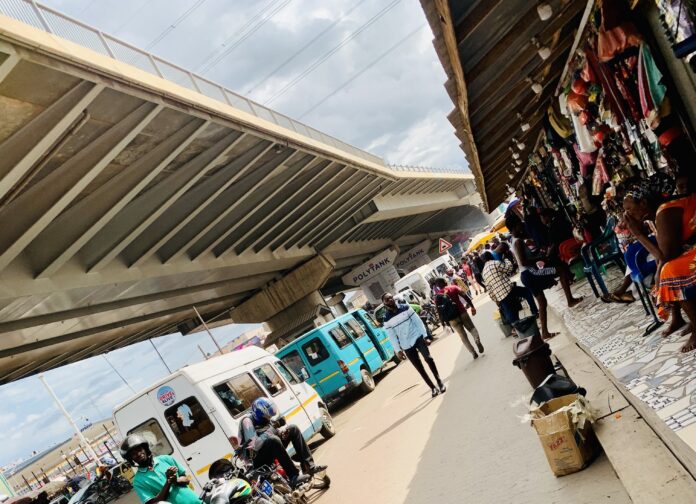Some commercial vehicle operators, popularly known as “trotro drivers”, at the former Kwame Nkrumah Circle, have abandoned the well-structured station to pick passengers alongside the Interchange.
This situation, The Chronicle noticed, has hindered the effectiveness of the main station, as some passengers rather patronise vehicles parked by the roadside without having to enter the station.
This reporter visited the rather busy business center on Tuesday, July 4, 2023, and observed that some of these drivers had parked their vehicles on the shoulders of the streets very close to the rail lines linking Circle to Kaneshie in the Greater Accra Region.
This worrying development is not only being perpetuated by intra-city vehicles, but some cars picking passengers to nearby Kumasi and other distant destinations.
The paper observed further that despite the closeness of well-structured stations, managed by transport unions, for commercial vehicles, these drivers appear to have thrown all caution to the wind.
They brazenly flout the laws by parking their vehicles and picking passengers and loading goods to various destinations.
The Chronicle, during the visit, interviewed some pedestrians who preferred patronising the vehicles by the roadside to the ones at the prescribed stations, with the excuse that the former set off early.
One Jacob Ansah, who was waiting by the roadside to board a vehicle instead of going to the station, told this paper that he preferred the roadside because of the fares.
He explained that those on the roadside do not charge flat fares, unlike the vehicles at the station, regardless of the passengers’ destinations charge a flat rate.
Another passerby, who only gave her name as Aunty Joyce, added that walking from her office to the main station was quite a distance, so she ends up boarding the available vehicle on that stretch of road.
Meanwhile, reacting to the development, the Station Officer of the Kwame Nkrumah Circle, Odawna Branch of the Ghana Private Road Transport Union (GPRTU) of the Trade Union Congress (TUC), Mr. Henry Quansah, told The Chronicle that most of these commercial vehicle drivers were trained by drivers at the main station, and were expected to continue working with them once they acquired their driving licenses and a vehicle to work with.
But, instead, they decided to load at the roadside, abandoning the well-structured stations with the excuse that loading passengers at the station took longer.
These drivers, he said, forget the fact that once they all come together to work at the main station, it would compel passengers to patronise there and reduce the time for the vehicles to fill up.
However, he cautioned passengers to patronise vehicles at the stations, as they could have their items left in those vehicles returned. But, since vehicles at the roadside were not known, tracing them was not possible.
The Station Master also explained “that most times, when some passengers forget any of their valuables in a commercial vehicle they boarded at the roadside, they seek assistance from the station’s office in finding the particular vehicle for their items, but we are unable to trace such commercial vehicles, because they are not known to us. But, if you forget any valuables in any of the vehicles at our stations, getting your items back intact is guaranteed.”
Mr. Quansah stressed his advised to the general public on the need to patronize commercial vehicles at the station for their own safety, because all vehicles, drivers and conductors are known.
Commenting on what the station officers to do to stop the menace, he indicated that, there was little his outfit could do end drivers loading on the shoulders of the roads.
His reason was that the very people they send to stop drivers from loading at such places allegedly take monies from the drivers and allow them to operate.
He called on the Motor Traffic and Transport Department Unit (MTTU) and other responsible authorities to come to their aid to help salvage the situation, to build the transport business, as this had become a common practice among some commercial drivers, not only at Circle.
By Stephanie Birikorang









